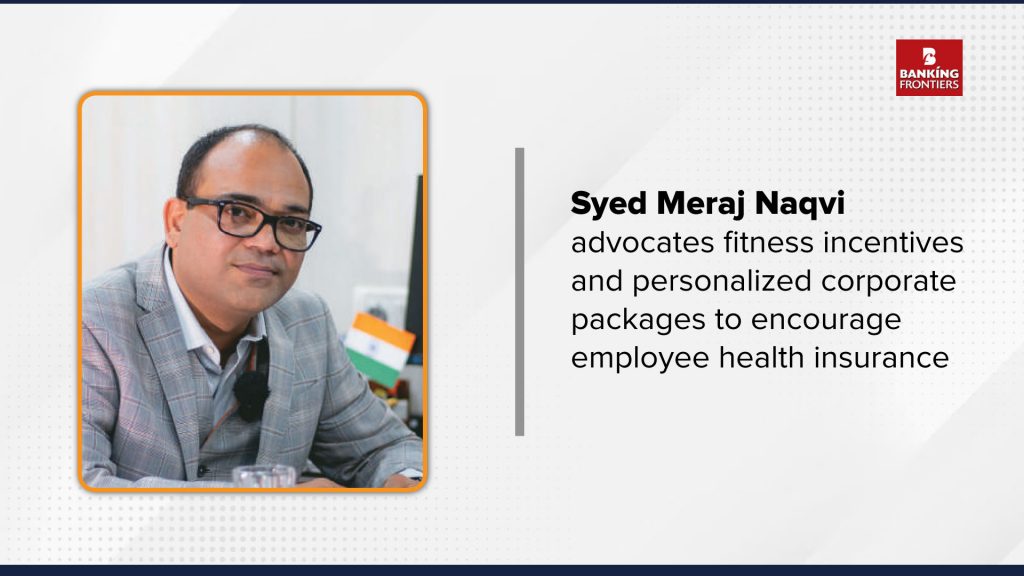Syed Meraj Naqvi, CEO & Principal Officer, Riskbirbal Insurance Brokers, discusses the employee health insurance landscape in India:

Ravi: How is corporate employee health insurance shaping up in India?
Syed: Health insurance business in India is categorized into 3 classes – government-sponsored, group, and individual. According to the IRDA Report 2021-22, in terms of the number of lives covered, around 59% of lives were covered under government-sponsored health insurance schemes, approximately 31% in group business, and the remaining 10% under individual policies issued by general and health insurers. In terms of the amount of premium, the highest share was of group business (50%), followed by individual (41%) and government business (9%). For group or corporate health insurance, the growth rate is 31% and the market share is 50% as calculated from the year 2020-21.
Moreover, Western India has a larger market overall for corporate health insurance.
Which industry verticals have the highest demand for corporate employee health insurance?
Majorly, IT and service industries. Also, manufacturers and SMEs are opting for group health insurance.
Please share recent product or service innovations by your organization?
In recent times, insurers have introduced various policies such as the Corona Kawach Policy (Covid Policy) and special plans customized for diabetic and hypertensive (HTN) patients. Additionally, there has been an enhancement in coverage options, including IVF treatments, coverage for non-payable items, restoration/refill of sum insureds, and modern treatments such as Cyber-knife Treatment, Lasik Surgeries, Robotic Surgeries, and Air Ambulance services, among others.
Riskbirbal’s WellConnect changes the entire employee healthcare and wellness spectrum with its revolutionary services including (i) seamless digital portal with easy healthcare support (ii) personalized health coverage (iii) hassle-free onboarding and 24×7 customer assistance (iv) complimentary health & wellness add-ons.
Give examples of customization that your organization has done for your corporate clients for health insurance.
Every corporate policy is customized according to the specific requirements and needs. For example, if there are a significant number of females in the group, we recommend coverages for maternity, including IVF treatments, and cover well-baby charges for newborns. If the policy is designed for employee parents only, we can exclude disease-wise capping or offer specific domiciliary coverages. In essence, various combinations of coverage can be tailored to the insured’s needs, and specific requirements can be addressed by designing coverages within the framework of the policy’s basic ethos. In accidental policies, various coverages can be provided, such as funeral expenses, child education benefits, family transportation expenses, home/vehicle modifications and protection against animal bites, among others.
Has your organization introduced any new employee fitness and wellness products in corporate insurance?
Yes, under WellConnect powered by Riskbirbal, we have introduced several new wellness-related value-added services, including health checkups, home sample collection, onsite health camps, unlimited teleconsultations with specialist doctors, employee assistance programs, online discounts, fitness sessions, disease care management and nutrition/diet counselling.
Our comprehensive services extend to network hospital locators, a policy knowledge hub, and a platform for HR networking that fosters a community of knowledge sharing. With initiatives ranging from discounted health treatments and insurance insights to birthday wishes and gifts, Wellconnect aims to provide holistic support for both personal and professional aspects of life. With our partners we offer extended services including customized corporate packages, fitness incentives, and health discounts.
What percentage of this business comes from direct, agents and other channels?
The total health business landscape (excluding personal accident and travel insurance), as per the IRDAI report 2021-2022, exhibits a diverse distribution. Online platforms contribute 2%, while offline channels hold at 29.5%. Individual agents represent 31.3% of the market. Corporate agents, further classified into banks (7.9%) and other entities (2.6%), collectively contribute to the industry’s distribution network. Brokers play a notable role, constituting 25.9% of the market share. Microinsurance agents, common service centers, web aggregators, insurance marketing firms, and PoS – each contribute to the distribution network, albeit with smaller percentages. Brokers’ dominance in the market of the group or corporate business is noteworthy, capturing a substantial 45.7% of the market share.
Read more:
Exponential digital technologies in Microfinance services

Sampath Bank, a local bank, yet tech savvy









